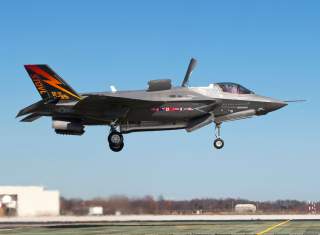Yes, Prototyping for the Air Force's New Sixth Generation Stealth Fighter Has Already Begun
Wait, already?
“For an adversary, this is a difficult concept to attack,” Deptula said.
Time is of course of the essence when it comes to air attack, air-to-air warfare and any kind of air-ground-surface coordination. Getting ahead of or inside an enemy’s “decision cycle,” is a phenomenon long-described by air warriors as completing the OODA loop - Observation, Orientation, Decision, Action - faster than an enemy, to win a dogfight. This is also one reason why hypersonic weapons are being pursued and tested with such vigor by the US and its major rivals. A weapon, drone or air asset of any kind traveling at five times the speed of sound presents a very serious “time” challenge when it comes to defending attacks.
While the notion of “manned” hypersonic flight is considered to be very far away, hypersonic weapons - to be followed by hypersonic drones - are moving closer to operational status. This greatly impacts the Air Force’s Penetrating Counter Air program because a 6th-generation aircraft might, for instance, be able to fire air-launched hypersonic weapons or launch hypersonic attack drones. It goes without saying that the faster an attack or ISR mission can operate in high-threat or enemy territory, the more its threat window can decrease. (For Warrior Maven's report on Air Force efforts to accelerate hypersonic weapons - CLICK HERE)
Interestingly, anticipated speed and range of enemy weapons and sensors continues to motivate ongoing discussion about whether “dogfighting” itself could become obsolete. Identifying, and potentially destroying an enemy aircraft before being seen is a key premise informing F-35 strategy. While the stealth fighter is engineered to dogfight, its Electro/Optical Targeting System and Distributed Aperture System are specifically designed to enable early detection of enemy fighters. The concept is, quite simply, to destroy an enemy before you yourself are seen, potentially preventing an enemy from coming close enough to require a dogfight.
This article by Kris Osborn originally appeared in WarriorMaven in 2020.
Kris Osborn is a Non-Resident Fellow at The Mitchell Institute for Aerospace Studies. He previously served at the Pentagon as a Highly Qualified Expert with the Office of the Assistant Secretary of the Army - Acquisition, Logistics& Technology. Osborn has also worked as an anchor and on-air military specialist at national TV networks. He has appeared as a guest military expert on Fox News, MSNBC, The Military Channel and The History Channel. He also has a Masters Degree in Comparative Literature from Columbia University.
Image: Reuters

